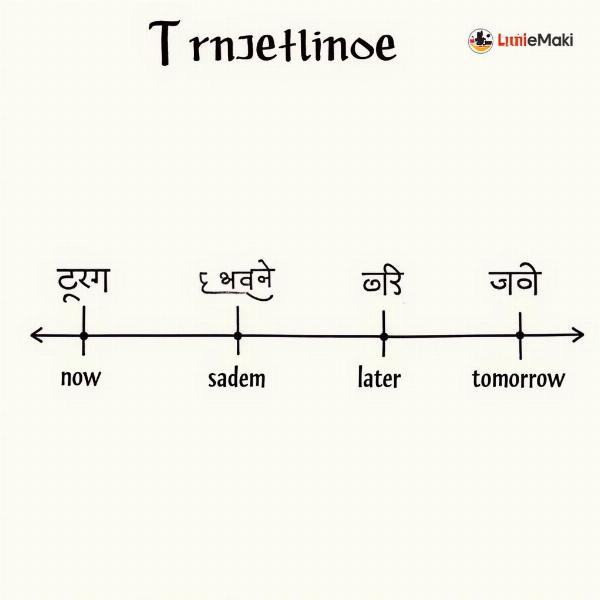Understanding the nuances of translating phrases like “I will tell him” into Hindi can be tricky. It’s not just about finding the right words, but also about capturing the subtle context and cultural implications. This guide explores the various ways to express “I will tell him” in Hindi, considering formality, politeness, and the specific situation.
Different Ways to Say “I Will Tell Him” in Hindi
Hindi, like many languages, offers multiple ways to convey the same idea. The best choice depends on the context and your relationship with the person you’re talking about. Here are some common translations:
- Main usse bataunga (मैं उससे बताऊँगा): This is the most common and straightforward translation. It’s suitable for most informal conversations.
- Main usko bataunga (मैं उसको बताऊँगा): This is another informal option, often used in spoken Hindi.
- Main unhe bataunga (मैं उन्हें बताऊँगा): This is the respectful form, used when addressing someone older or someone you want to show respect to.
- Main unko bataunga (मैं उनको बताऊँगा): Similar to the above, this is also a respectful form, commonly used in spoken Hindi.
- Main usse kahunga (मैं उससे कहूँगा): This translates to “I will say to him,” offering a slightly different nuance than “tell.”
- Main unse kahunga (मैं उनसे कहूँगा): This is the respectful form of “I will say to him.”
Choosing the Right Translation
The social context plays a vital role in choosing the right Hindi translation. For example, using the informal “usse” with an elder could be considered disrespectful. Similarly, using the overly formal “unhe” with a close friend might sound unnatural.
Formal vs. Informal Hindi
Understanding the difference between formal and informal Hindi is crucial. Formal Hindi uses respectful pronouns like “aap” (आप) and “un” (उन), while informal Hindi uses “tu” (तू) and “tum” (तुम), though the latter is less common these days. “I will tell him” requires using the third-person pronoun, so the distinction lies between “usse/usko” (informal) and “unhe/unko” (formal).
Will vs. Going to: Subtle Differences in Meaning
While “I will tell him” implies a future action, the specific timing can be ambiguous. Consider these alternatives:
- Main usse abhi bataunga (मैं उससे अभी बताऊँगा): This means “I will tell him now,” indicating immediate action.
- Main usse baad mein bataunga (मैं उससे बाद में बताऊँगा): This translates to “I will tell him later,” specifying a delayed action.
 Future tense variations in Hindi
Future tense variations in Hindi
Beyond the Basics: Adding Emphasis and Nuance
You can further refine the meaning by adding adverbs and other modifiers. For instance:
- Main usse zaroor bataunga (मैं उससे ज़रूर बताऊँगा): “I will definitely tell him.”
- Main usse sach bataunga (मैं उससे सच बताऊँगा): “I will tell him the truth.”
Conclusion: Mastering “I Will Tell Him” in Hindi
Choosing the right way to say “I will tell him” in Hindi depends on understanding the nuances of the language and the cultural context. By considering the level of formality, your relationship with the person you are talking about, and the specific situation, you can ensure your message is conveyed accurately and respectfully. Mastering these subtle differences can greatly enhance your communication skills in Hindi.
FAQ:
- When should I use “usse” versus “unhe”? Use “usse” for informal conversations and “unhe” for formal situations or when showing respect.
- What is the difference between “bataunga” and “kahunga”? “Bataunga” means “I will tell,” while “kahunga” means “I will say,” implying a slightly different nuance.
- How can I express “I will tell him later” in Hindi? Use “Main usse baad mein bataunga.”
- What is the respectful way to say “I will tell him”? “Main unhe bataunga” or “Main unko bataunga” are respectful options.
- How can I emphasize that I will definitely tell him? Add “zaroor” (ज़रूर) to the sentence: “Main usse zaroor bataunga.”
- Is there a difference between “usko” and “usse”? Both are informal, but “usko” is more common in spoken Hindi in some regions.
- How do I say “I will tell him now”? Use “Main usse abhi bataunga.”
Meaning-Hindi.in is your one-stop solution for all your Hindi translation needs. We offer a wide range of professional translation services, including business and commercial document translation, certified and legal document translation, technical and user manual translation, website and localization, educational and academic document translation, express translation, and specialized translation services. Contact us today for accurate and culturally sensitive translations that meet your specific requirements. Email: [email protected], Phone: +91 11-4502-7584. Meaning-Hindi.in understands the nuances of both Hindi and English, ensuring your message is conveyed effectively.